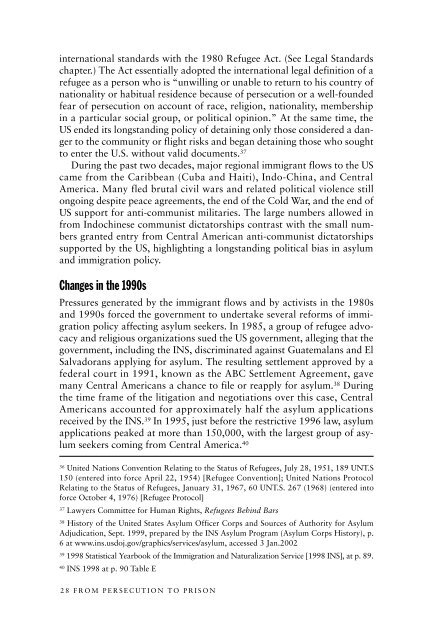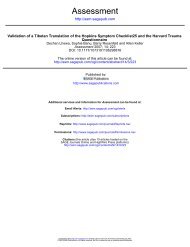From Persecution to Prison - Bellevue/NYU Program for Survivors of ...
From Persecution to Prison - Bellevue/NYU Program for Survivors of ...
From Persecution to Prison - Bellevue/NYU Program for Survivors of ...
Create successful ePaper yourself
Turn your PDF publications into a flip-book with our unique Google optimized e-Paper software.
international standards with the 1980 Refugee Act. (See Legal Standardschapter.) The Act essentially adopted the international legal definition <strong>of</strong> arefugee as a person who is “unwilling or unable <strong>to</strong> return <strong>to</strong> his country <strong>of</strong>nationality or habitual residence because <strong>of</strong> persecution or a well-foundedfear <strong>of</strong> persecution on account <strong>of</strong> race, religion, nationality, membershipin a particular social group, or political opinion.” At the same time, theUS ended its longstanding policy <strong>of</strong> detaining only those considered a danger<strong>to</strong> the community or flight risks and began detaining those who sought<strong>to</strong> enter the U.S. without valid documents. 37During the past two decades, major regional immigrant flows <strong>to</strong> the UScame from the Caribbean (Cuba and Haiti), Indo-China, and CentralAmerica. Many fled brutal civil wars and related political violence stillongoing despite peace agreements, the end <strong>of</strong> the Cold War, and the end <strong>of</strong>US support <strong>for</strong> anti-communist militaries. The large numbers allowed infrom Indochinese communist dicta<strong>to</strong>rships contrast with the small numbersgranted entry from Central American anti-communist dicta<strong>to</strong>rshipssupported by the US, highlighting a longstanding political bias in asylumand immigration policy.Changes in the 1990sPressures generated by the immigrant flows and by activists in the 1980sand 1990s <strong>for</strong>ced the government <strong>to</strong> undertake several re<strong>for</strong>ms <strong>of</strong> immigrationpolicy affecting asylum seekers. In 1985, a group <strong>of</strong> refugee advocacyand religious organizations sued the US government, alleging that thegovernment, including the INS, discriminated against Guatemalans and ElSalvadorans applying <strong>for</strong> asylum. The resulting settlement approved by afederal court in 1991, known as the ABC Settlement Agreement, gavemany Central Americans a chance <strong>to</strong> file or reapply <strong>for</strong> asylum. 38 Duringthe time frame <strong>of</strong> the litigation and negotiations over this case, CentralAmericans accounted <strong>for</strong> approximately half the asylum applicationsreceived by the INS. 39 In 1995, just be<strong>for</strong>e the restrictive 1996 law, asylumapplications peaked at more than 150,000, with the largest group <strong>of</strong> asylumseekers coming from Central America. 4036United Nations Convention Relating <strong>to</strong> the Status <strong>of</strong> Refugees, July 28, 1951, 189 UNT.S150 (entered in<strong>to</strong> <strong>for</strong>ce April 22, 1954) [Refugee Convention]; United Nations Pro<strong>to</strong>colRelating <strong>to</strong> the Status <strong>of</strong> Refugees, January 31, 1967, 60 UNT.S. 267 (1968) (entered in<strong>to</strong><strong>for</strong>ce Oc<strong>to</strong>ber 4, 1976) [Refugee Pro<strong>to</strong>col]37Lawyers Committee <strong>for</strong> Human Rights, Refugees Behind Bars38His<strong>to</strong>ry <strong>of</strong> the United States Asylum Officer Corps and Sources <strong>of</strong> Authority <strong>for</strong> AsylumAdjudication, Sept. 1999, prepared by the INS Asylum <strong>Program</strong> (Asylum Corps His<strong>to</strong>ry), p.6 at www.ins.usdoj.gov/graphics/services/asylum, accessed 3 Jan.2002391998 Statistical Yearbook <strong>of</strong> the Immigration and Naturalization Service [1998 INS], at p. 89.40INS 1998 at p. 90 Table E28 FROM PERSECUTION TO PRISON



